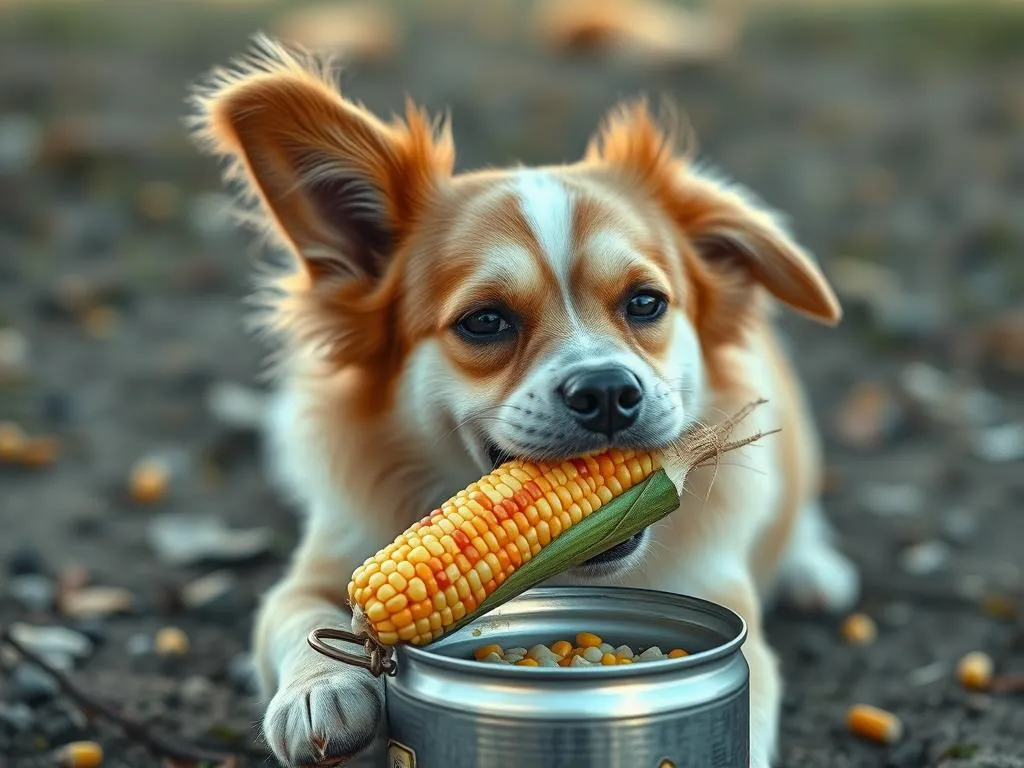
Introduction
Understanding dog nutrition is fundamental for any pet owner who wants to ensure their furry friend leads a healthy and happy life. Proper nutrition contributes significantly to a dog’s overall health, influencing everything from energy levels to coat quality. Among the many food options available, corn often comes up in discussions about dog diets. This article explores the question, “Can dogs eat corn?” and provides a comprehensive understanding of its effects on dogs.
Understanding Dog Nutrition
Importance of a Balanced Diet
A balanced diet is crucial for dogs, just as it is for humans. Dogs require a mix of essential nutrients to thrive. These include:
- Proteins: Essential for growth, maintenance, and repair of tissues. Proteins are also vital for producing hormones and enzymes.
- Fats: Provide energy and help in the absorption of fat-soluble vitamins. Healthy fats contribute to a shiny coat and healthy skin.
- Carbohydrates: Serve as a source of energy and aid in digestion. They can be derived from grains and vegetables.
- Vitamins and Minerals: Vital for numerous bodily functions, from bone health to immune system support.
Providing a balanced diet not only promotes a dog’s physical health but also enhances their mood and behavior.
Common Dog Food Ingredients
Commercial dog foods generally contain a variety of ingredients designed to meet a dog’s nutritional needs. Common components include:
- Meat: The primary source of protein in dog food, often chicken, beef, or fish.
- Grains: Ingredients like rice, barley, and corn serve as energy sources and provide fiber.
- Vegetables: Carrots, peas, and sweet potatoes offer essential vitamins and minerals while adding fiber to the diet.
Understanding these ingredients can help pet owners make informed decisions about their dog’s diet.
Overview of Corn in Dog Diets
Nutritional Profile of Corn
Corn is a common ingredient in many commercial dog foods. Its nutritional profile includes:
- Carbohydrates: Corn is primarily composed of carbohydrates, making it a significant energy source.
- Fiber: Aids in digestion and can help prevent constipation.
- Vitamins: Contains vitamins B and E, which are important for energy metabolism and immune function.
When compared to other grains like wheat or rice, corn is a decent source of energy but is often criticized for being a less digestible protein source.
Types of Corn
There are several forms of corn used in dog food:
- Whole Corn: The most basic form, commonly used in many dog foods.
- Cornmeal: Ground corn that can be used in various recipes.
- Corn Gluten Meal: A byproduct of corn processing that is high in protein.
Understanding the difference between processed and unprocessed corn is crucial. Whole corn is more nutritious than corn byproducts, which can sometimes be less beneficial.
Can Dogs Eat Corn?
Safety of Feeding Corn to Dogs
The general consensus among veterinarians is that dogs can safely eat corn. However, some dogs may have allergies or sensitivities to corn, which can lead to gastrointestinal upset or skin issues. It’s essential always to monitor your dog’s reaction after introducing new foods.
Health Benefits of Corn for Dogs
Corn does offer several health benefits for dogs:
- Nutritional Benefits: The fiber in corn can help promote healthy digestion. Additionally, as a carbohydrate source, it provides energy, especially for active dogs.
- Healthy Digestion: The fiber content can aid in maintaining regular bowel movements and preventing constipation.
These benefits make corn a reasonable addition to a dog’s diet when given in moderation.
Risks and Considerations
Despite its benefits, there are some risks to consider when feeding corn to dogs:
- Digestive Issues: Some dogs may find corn difficult to digest, especially those with sensitive stomachs. Corn is often viewed as a filler in some low-quality dog foods, which can lead to nutritional deficiencies if relied upon too heavily.
- Corn on the Cob: Feeding dogs corn on the cob poses choking hazards and the risk of intestinal blockage, making it a dangerous choice.
Balancing the benefits and risks is crucial when considering corn as part of a dog’s diet.
How to Safely Introduce Corn into a Dog’s Diet
Preparing Corn for Dogs
If you decide to introduce corn to your dog’s diet, preparation is key:
- Recommended Cooking Methods: Boiling or steaming corn is the best way to prepare it. These methods ensure that the corn is soft and easier for dogs to digest.
- Avoiding Additives: It’s crucial to keep corn plain. Avoid adding butter, salt, or any seasonings, as these can be harmful to dogs.
Properly prepared corn can be a tasty treat for your dog.
Portion Control and Frequency
When incorporating corn into your dog’s meals, portion control is vital:
- Suggested Serving Sizes: For small dogs, a tablespoon of corn is sufficient, while larger dogs might enjoy a quarter cup. Always adjust based on your dog’s size and dietary needs.
- Frequency: Corn should be treated as an occasional treat rather than a daily staple. Moderation is essential to prevent any potential digestive issues.
By following guidelines on portion control and frequency, you can safely include corn in your dog’s diet.
Alternatives to Corn
Other Vegetables and Grains
If you’re looking for alternatives to corn, several vegetables and grains can serve as excellent options:
- Sweet Potatoes: High in fiber and vitamins, sweet potatoes are a nutritious alternative.
- Peas: A good source of protein and vitamins, peas can be easily added to meals.
- Brown Rice: A digestible grain that provides energy and helps with digestion.
These alternatives can provide a variety of nutrients and keep your dog’s diet interesting.
Homemade Dog Food Recipes
Creating homemade dog food can be a rewarding way to ensure your dog receives balanced nutrition. Here are a couple of quick recipes:
- Chicken and Rice Bowl: Cooked chicken, brown rice, and steamed carrots make a nutritious meal.
- Sweet Potato Mash: Boiled sweet potatoes mixed with a bit of plain yogurt can be a delicious treat.
Always consult with a veterinarian to ensure the meals are balanced and meet your dog’s specific dietary needs.
Conclusion
In summary, corn can be a safe and beneficial addition to a dog’s diet when prepared correctly and offered in moderation. Understanding the nutritional profile of corn, along with the potential benefits and risks, helps pet owners make informed decisions. Always consult with a veterinarian for personalized dietary advice tailored to your dog’s health and needs.
FAQs
Can dogs eat corn every day?
While dogs can eat corn, it should not be a daily staple. Moderation is key to preventing digestive issues and ensuring a balanced diet.
What should I do if my dog has a corn allergy?
If you suspect your dog has a corn allergy, look for signs such as itching, gastrointestinal upset, or skin irritations. Consult your veterinarian for appropriate testing and recommendations.
Are there any dog food brands that use corn?
Yes, many dog food brands include corn as an ingredient. Brands like Purina and Hill’s Science Diet often incorporate corn for its energy-boosting properties and fiber content.
By providing your dog with nutritious options and monitoring their health, you can ensure they live a long and happy life.









